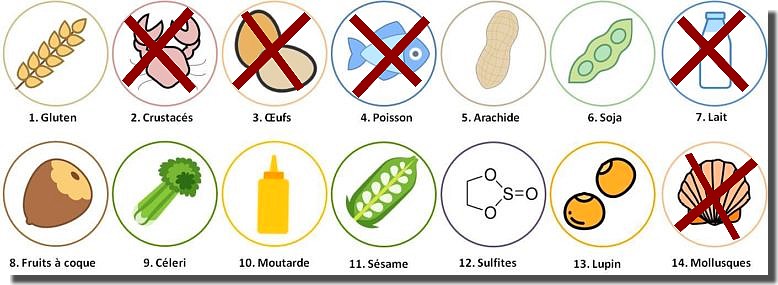
Below you’ll find the 14 most common food allergens, excluding animal products that we don’t use. This will make it easier for you to identify the dishes that pose a threat to you if you’re allergic.
When you place your order, let us know if you have any allergies, and we’ll advise you on our dishes.
Celery is a common ingredient in many broths and soups. Expect to find it in popular dishes such as pastas, salads, stews and various stir-fries.
Gluten. The three main cereal varieties to watch are wheat, rye and barley. They contain high levels of gluten proteins, which are the main triggers of an allergic reaction. This means that all dishes containing flour are affected: breads and pastas, desserts and cookies, couscous, bulgur, seitan, ice cream, salad dressings, etc.
Lupins belong to the legume family, like peanuts and soybeans, and are eaten as a candied snack throughout the Mediterranean region and Latin America. Lupin can also be found in various spreads, such as chocolate and hummus, as well as in baked goods and pasta dishes.
Peanut. Another legume, the humble peanut, is probably the most famous of the 14 common food allergens. Often used as an ingredient in chocolate bars, peanuts can also be found in various Thai food dishes, salad dressings, vegetarian meat substitutes, and various Asian condiments and sauces.
Soy, a product of the soya bean, is a common allergen worldwide for restaurants serving vegan or Asian dishes: sushi, pad thai, miso soup, and the like.
Mustard. Although fresh mustard seeds, leaves and flowers aren’t usually found in very many dishes, you’re bound to have a good mustard and mustard spread on your shelves.
Nuts, such as walnuts, hazelnuts, almonds, cashews, pecans (and many other nuts and drupes) are potentially more important to chefs than peanuts (which are actually legumes, not real nuts).
This is because nuts can be found in many different basic ingredients and dishes: ice creams, various curries, pesto sauces, salads and dressings, vegetarian products, certain oils, etc.
Sesame seeds may seem innocent, but they’re a major source of concern for people who are allergic to them.
Exotic ingredients and dishes that may contain large quantities of sesame seeds include gomashio, tahini, hummus, halvah and various stir-fries.
Sulfites are compounds containing the sulfite ion (e.g. sulfur dioxide, potassium bisulfate, sodium sulfite and sulfuric acid). Some foods naturally contain sulfites, but in most cases they are added for their preservative properties.
Sulfites are usually found in processed meats (hamburgers and sausages), dried fruits and vegetables (such as dried apricots), soft drinks, picked foods, wine, beer and more.
